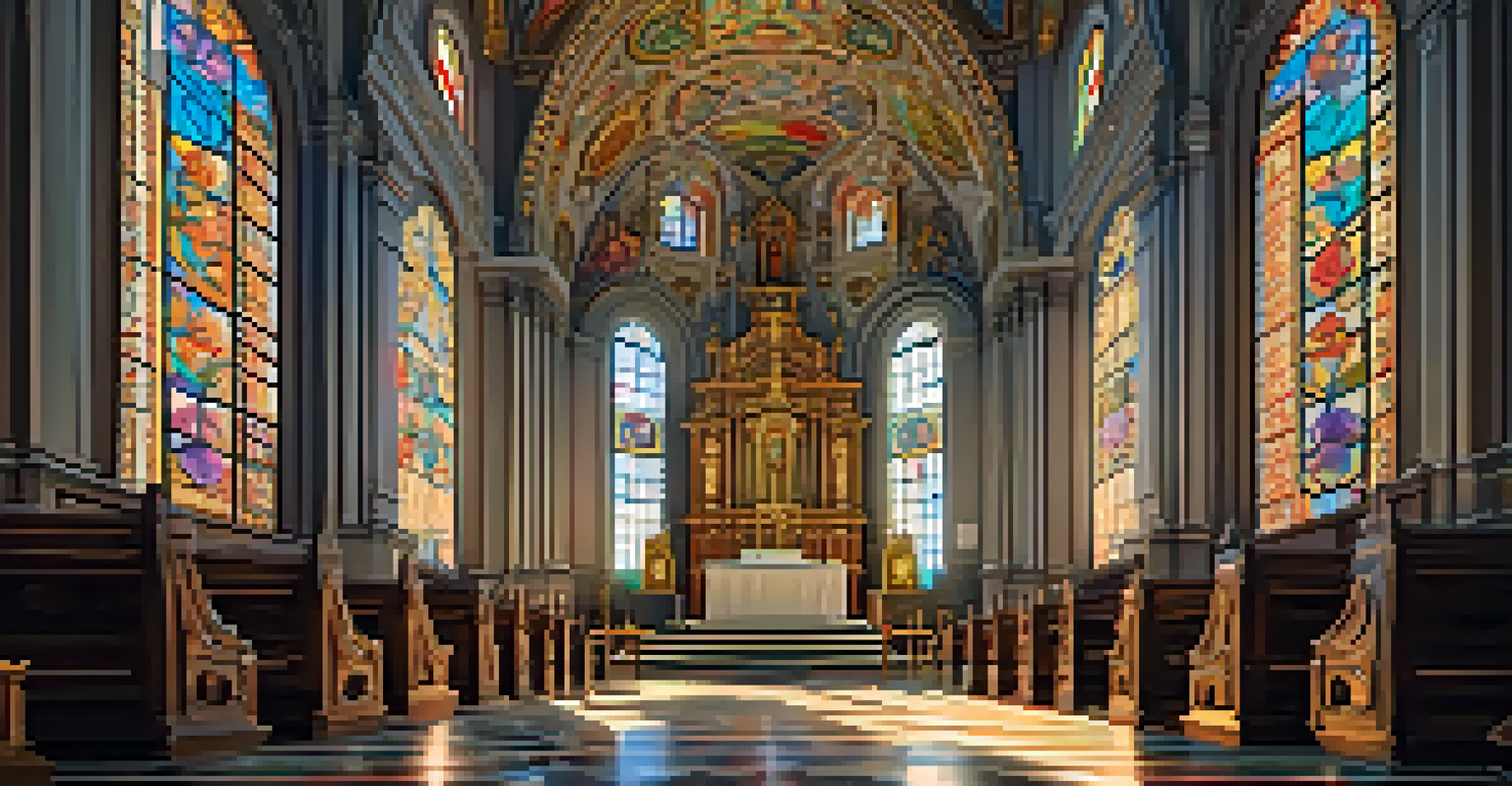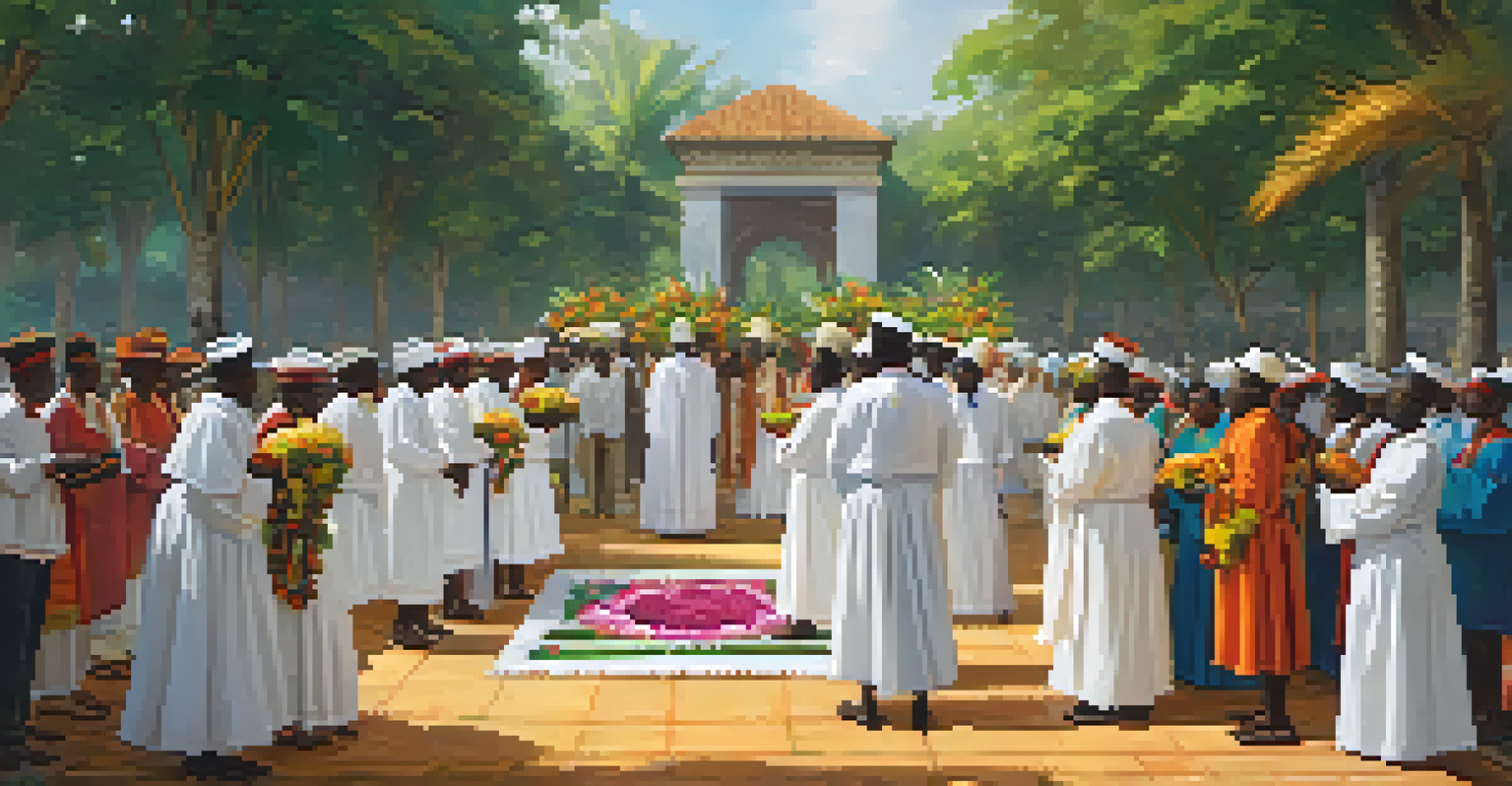The Role of Religion in Brazil's Historical Tours Experience

The Diverse Religious Landscape of Brazil
Brazil is a melting pot of religions, reflecting its history and culture. From Catholicism to Afro-Brazilian religions like Candomblé, the spiritual practices here are rich and varied. This diversity is not just a belief system; it shapes festivals, art, and community life, making it a crucial part of the Brazilian identity.
Religion is the solid ground of the culture of a people, and its richness is reflected in every aspect of their lives.
When you embark on a historical tour in Brazil, you’re not just learning about the past; you’re experiencing the vibrant spiritual traditions that have influenced architecture, music, and local customs. For instance, the iconic churches in Salvador reveal the deep roots of Catholicism intertwined with African traditions.
Understanding this religious tapestry enhances your appreciation of Brazil's historical sites, as they often serve as focal points for cultural gatherings and celebrations. Whether it's a samba parade or a religious festival, each experience is a window into the heart of Brazilian spirituality.
The Influence of Catholicism on Historical Architecture
Catholicism has played a pivotal role in shaping Brazil’s architectural landscape, especially during the colonial period. Many of the country's most stunning historical sites, such as churches and cathedrals, were built to honor religious figures and showcase the power of the church. These structures often blend European styles with local materials, creating unique landmarks.

For example, the São Francisco Church in Salvador features intricate Baroque designs that tell stories of faith and devotion. Tours of such sites not only highlight their architectural beauty but also delve into their historical significance as centers of community life and religious activity.
Brazil's Rich Religious Diversity
Brazil's spiritual landscape is a vibrant mix of Catholicism, Afro-Brazilian religions, and indigenous beliefs that shapes its culture and identity.
Visiting these cathedrals offers a deeper understanding of the social dynamics at play throughout Brazil's history. They serve as reminders of the impact of colonization and the ongoing relationship between religion and culture in contemporary Brazil.
Afro-Brazilian Religions and Their Cultural Significance
Afro-Brazilian religions like Candomblé and Umbanda are crucial to understanding Brazil's historical narrative. These religions emerged from the blending of African traditions with local customs, especially during the era of slavery. Candomblé, in particular, involves vibrant rituals, music, and dance that celebrate African heritage and spirituality.
Art is a reflection of the spiritual life of a people, and in Brazil, it intertwines with the diverse religious practices that shape our identity.
Historical tours often include visits to Candomblé terreiros (places of worship), where you can witness firsthand the colorful ceremonies and hear the stories of the orixás, or deities. This experience highlights the resilience of Afro-Brazilian culture and its significant contributions to the country's identity.
Engaging with these religious practices during tours allows visitors to appreciate the depth of Brazil's spiritual life. It fosters a respectful understanding of how these traditions coexist with other religions, creating a unique and dynamic cultural landscape.
Religious Festivals as Historical Touchpoints
Brazil is famous for its vibrant festivals, many of which have strong religious roots. Events like Carnaval and Festa de Iemanjá are more than just celebrations; they are expressions of faith, community, and cultural heritage. These festivals often provide historical context, showcasing how religion influences social life in Brazil.
During Carnaval, for instance, you’ll find that many samba schools pay homage to deities and incorporate religious themes into their parades. This intertwining of spirituality and festivity highlights the importance of religion in shaping the nation’s identity and collective memory.
Cultural Impact of Religious Festivals
Festivals like Carnaval and Festa de Iemanjá highlight the deep connections between religion, community, and Brazil's historical narrative.
Participating in these festivals during a historical tour can be a transformative experience, connecting you with the local community and its traditions. It’s an opportunity to witness how the past is celebrated in the present, creating a living history that is both engaging and enlightening.
Indigenous Spirituality and Historical Narratives
Indigenous spirituality is an integral part of Brazil's historical narrative, offering unique insights into the country’s past. Many indigenous communities maintain their spiritual practices and beliefs, which often revolve around nature and ancestral worship. Their rich traditions provide a contrasting perspective to the dominant Catholic and Afro-Brazilian religions.
Historical tours that include indigenous sites or communities can reveal how these spiritual practices have been preserved despite centuries of colonization and cultural erasure. For example, rituals that honor the earth and the spirits of ancestors highlight the deep connection indigenous peoples have with their land.
Engaging with these practices not only enriches your understanding of Brazil's diverse religious landscape but also emphasizes the importance of respecting and acknowledging indigenous rights and cultures. It’s a reminder of the resilience of these communities and their ongoing contributions to Brazil’s identity.
The Role of Religion in Brazilian Art and Literature
Religion has significantly influenced Brazil's artistic expressions, from visual arts to literature. Many Brazilian artists and writers draw inspiration from religious themes, creating works that reflect the complexities of faith, culture, and identity. This interplay of religion and art is evident in the works of renowned figures such as Jorge Amado and Candido Portinari.
Historical tours often showcase how religious motifs appear in paintings, sculptures, and literature, providing deeper insights into the societal values and beliefs of different eras. For instance, Portinari's murals in the São Francisco Church depict biblical stories intertwined with Brazilian life, bridging the gap between the sacred and the everyday.
Evolving Religious Landscape Today
The contemporary religious scene in Brazil reflects social changes, with a rise in evangelical churches and a renewed interest in Afro-Brazilian and indigenous practices.
Experiencing this art firsthand during your tour can evoke a sense of connection to the spiritual and cultural narratives that shape Brazil. It highlights how religion not only serves as a foundation for artistic expression but also fosters dialogue about identity and heritage.
The Contemporary Landscape of Religion in Brazil
Today, Brazil’s religious landscape continues to evolve, reflecting broader social changes and cultural shifts. While Catholicism remains prevalent, there is a growing presence of evangelical churches and a resurgence of interest in Afro-Brazilian and indigenous spiritual practices. This evolving landscape influences everything from politics to community dynamics.
Historical tours in Brazil now often highlight these contemporary religious movements, providing context for understanding current social issues. For example, exploring the role of religion in political activism reveals how faith can drive social change and community engagement.

By examining the contemporary landscape of religion during your tour, you gain insights into the ongoing dialogue between tradition and modernity. This understanding enriches your experience and illustrates the dynamic role religion plays in shaping Brazil’s future.
Conclusion: Embracing Brazil's Spiritual Heritage
As you explore Brazil's historical tours, the role of religion emerges as a central theme that connects the past to the present. From the stunning architecture of colonial churches to the vibrant celebrations of Afro-Brazilian festivals, each aspect tells a story of resilience, community, and identity. This rich spiritual heritage is not only fascinating but essential to understanding Brazil as a whole.
Engaging with these diverse religious practices during your travels allows for a deeper connection with the culture and people of Brazil. It fosters an appreciation for the complexities of belief systems and their impact on daily life and historical narratives.
In embracing Brazil's spiritual heritage, you’re not just a tourist; you become part of an ongoing story that celebrates diversity, resilience, and the interconnectedness of faith and culture.